
Digithum
Scope & Guideline
Advancing Research with Open Access for All.
Introduction
Aims and Scopes
- Cultural Ruination and Landscapes:
The journal explores the concept of ruination in both physical and cultural landscapes, examining how these spaces reflect societal changes and historical narratives. - Sociological Perspectives on Modern Work:
It investigates the socio-economic dimensions of contemporary work, particularly in relation to gig economies and platform labor, highlighting issues of alienation and precariousness. - Emotional and Relational Sociology:
Digithum emphasizes the role of emotions in social interactions and structures, drawing on the legacy of theorists like Georg Simmel to analyze contemporary relational dynamics. - Interdisciplinary Approaches to the Anthropocene:
The journal contributes to the discourse on the Anthropocene by integrating perspectives from sociology, philosophy, and cultural studies to address the complexities of human-nature relationships. - Critical Examination of Media and Society:
It also critiques the role of media in shaping social narratives and identities, particularly in the context of crises and social mobilization.
Trending and Emerging
- Exploration of Anthropocenic Ruins:
A significant focus on the Anthropocene and its implications for landscapes and human experience is evident, with papers analyzing how ruins serve as a commentary on contemporary environmental and social issues. - Gig Economy and Alienation:
The rise of research related to gig economies and the social dynamics of platform work reflects a growing concern with economic precariousness and the emotional ramifications of modern labor. - Emotional Sociology:
An increasing interest in the emotional dimensions of social life, including gratitude, relational dynamics, and the impact of crises on emotional well-being, signals a shift towards understanding the complexities of human interaction. - Media's Role in Social Narratives:
The journal is increasingly addressing how media shapes public perception and social mobilization, particularly in the context of crises like the COVID-19 pandemic, indicating a trend towards media studies within sociological research. - Interdisciplinary Methodologies:
There is a noticeable trend towards interdisciplinary methodologies that blend sociology with cultural studies, philosophy, and critical theory, reflecting a holistic approach to understanding contemporary issues.
Declining or Waning
- Traditional Sociological Theories:
There appears to be a waning focus on classical sociological theories that do not engage with contemporary issues, as the journal has shifted towards more applied and current themes. - Historical Analysis of Societal Structures:
Themes centered around a purely historical analysis of societal structures without linking to present-day implications are becoming less frequent, suggesting a preference for contemporary relevance. - Narrowed Focus on Specific Geographies:
The journal seems to be moving away from regionally focused studies that do not connect to broader global or theoretical discussions, indicating a trend towards more universal themes.
Similar Journals
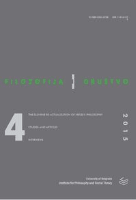
Philosophy and Society-Filozofija i Drustvo
Fostering Enlightenment Through Philosophy and Social InquiryPhilosophy and Society-Filozofija i Drustvo is an esteemed, peer-reviewed journal published by the UNIV BELGRADE, INST PHILOSOPHY & SOCIAL THEORY, with ISSN 0353-5738 and E-ISSN 2334-8577. Established as an Open Access platform since 2002, the journal provides a vital avenue for scholars to disseminate their research in the fields of philosophy, sociology, and political science. Based in Belgrade, Serbia, it has become increasingly influential, reflected in its Scopus rankings—#413 in Arts and Humanities (Philosophy) and #1185 in Social Sciences (Sociology and Political Science). The journal aims to foster critical discourse and multidisciplinary dialogue, serving both seasoned researchers and emerging scholars alike. As it continues its journey in the converged years from 2018 to 2024, Philosophy and Society remains committed to exploring philosophical inquiries within contemporary societal contexts, addressing pressing issues and questions that shape our world.

SOCIETES
Fostering academic inquiry amidst evolving societal landscapes.SOCIETES, published by DE BOECK UNIV in Belgium, serves as a vital platform for researchers, professionals, and students within the fields of Arts and Humanities, Demography, and Sociology and Political Science. The journal, bearing the ISSN 0765-3697 and E-ISSN 1782-155X, is recognized for its scholarly contributions since its inception in 1996 and anticipates continued relevance through 2024. As a distinguished publication in the Q3 and Q4 category quartiles, SOCIETES ranks within the 20th percentile in Arts and Humanities, as well as the 6th percentile in Demography and Sociology and Political Science, reflecting its position among emerging voices in these disciplines. Despite its current classification, the journal aims to enhance interdisciplinary dialogue and enrich academic discourse through its carefully curated articles. Although it does not currently offer open access, SOCIETES remains committed to bridging gaps in research and fostering rigorous academic inquiry amidst evolving societal landscapes.

Chinese Journal of Sociology
Unveiling the Complexities of Society Through Rigorous Research.The Chinese Journal of Sociology, published by SAGE Publications Ltd, is a leading venue for research in the field of sociology, with a focus on contemporary social issues within and beyond China. Since its establishment in 2015, the journal has gained a reputation for its rigorous peer-reviewed articles, contributing significantly to scholarly discourse and understanding of social dynamics in a rapidly changing world. With an impressive Q2 category ranking in Social Sciences and a solid Scopus rank of #111 out of 275, it serves as an essential resource for researchers, professionals, and students keen to explore the complexities of social structures and behaviors. Although not an open access journal, it offers access to a wealth of knowledge and insights, underlining its importance in the academic community. Located in the United Kingdom, the journal strives to foster interdisciplinary collaborations and highlight diverse perspectives, making it an invaluable platform for social science scholarship dedicated to advancing our understanding of the societal landscape.

New Global Studies
Pioneering Insights into Global and Local InteractionsNew Global Studies is a distinguished academic journal published by WALTER DE GRUYTER GMBH, focusing on the diverse interdisciplinary fields of Arts and Humanities, Economics, and Social Sciences. Since its inception in 2007, this journal has provided a platform for innovative research that explores contemporary global issues from multifaceted perspectives. With an ISSN of 1940-0004, it has garnered a reputation for high-quality scholarship, reflected in its Scopus rankings, where it stands in the top 24% of Arts and Humanities and is recognized for its contributions to Social Sciences. New Global Studies aims to foster dialogue and exchange among scholars, practitioners, and students, contributing to our understanding of global dynamics and local implications. While the journal is not currently open access, its commitment to academic rigor and relevance makes it an essential resource for researchers seeking to deepen their insights into the ever-evolving global landscape. The journal is based in Berlin, Germany, and continues to thrive in its mission until at least 2024.

Open Library of Humanities
Innovating Research Dissemination in the Arts and HumanitiesThe Open Library of Humanities, a premier platform established in 2015 and based in the United Kingdom, elevates the discourse in the fields of Anthropology, Arts and Humanities, Cultural Studies, and Sociology and Political Science. Published by OPEN LIBRARY OF HUMANITIES, this open access journal provides a prominently accessible space for scholars and researchers to disseminate their findings and contribute to a diverse range of academic conversations. With an impressive Scopus ranking that reflects its influence—ranking in the 87th percentile in General Arts and Humanities and in the 80th percentile for Cultural Studies—the journal is recognized for publishing high-quality research that addresses significant and contemporary issues within its scope. By embracing a multidisciplinary approach, the Open Library of Humanities fosters interdisciplinary dialogue and encourages innovative research dissemination practices. Scholars, students, and practitioners are invited to engage with the latest developments and theoretical insights that enrich our understanding of the human experience.
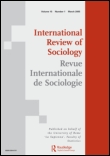
International Review of Sociology-Revue Internationale de Sociologie
Navigating the complexities of social science since 1987.International Review of Sociology-Revue Internationale de Sociologie is a distinguished academic journal published by Routledge Journals, Taylor & Francis Ltd, focusing on the critical exploration of sociological and political science theories and practices. Since its inception, the journal has continually evolved, with publications dating back to 1987, and it remains a prominent reference point within its field, currently ranking in the Q2 category for Sociology and Political Science in 2023. With an impressive Scopus rank of #430 out of 1466, it places the journal in the 70th percentile among social sciences journals, reflecting its influence and significance in advancing sociological discourse. The International Review of Sociology serves as a platform for researchers, practitioners, and students eager to engage with contemporary issues, fostering a rich exchange of ideas that spans across cultural, political, and social dimensions. While it does not currently offer open access, its rigorous peer-review process ensures the publication of high-quality research essential for both academic and professional audiences.
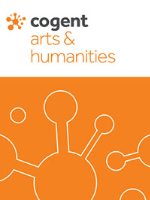
Cogent Arts & Humanities
Shaping the Future of Arts and Humanities ScholarshipCogent Arts & Humanities, published by Taylor & Francis AS, is a prominent Open Access journal that has been serving the arts and humanities community since its inception in 2014. With an impressive Scopus rank of 16 out of 173 in the field and a 2023 category quartile of Q2, it stands out as a significant platform for disseminating high-quality research. The journal covers a diverse range of topics within the arts and humanities, fostering interdisciplinary dialogue and innovation. Its commitment to accessibility makes cutting-edge research available to a global audience, contributing to the advancement of knowledge and practice in this vital field. With an impact factor that continues to grow, Cogent Arts & Humanities is an essential resource for researchers, professionals, and students dedicated to exploring the complexities of human culture and creative expression.

TRAMES-Journal of the Humanities and Social Sciences
Connecting scholars through critical insights and quality scholarship.TRAMES - Journal of the Humanities and Social Sciences is a distinguished academic publication by Estonian Academy Publishers, dedicated to advancing scholarship in the fields of humanities and social sciences. Established in Estonia and transitioning to an open access model in 2021, this journal strives to foster an inclusive platform that disseminates innovative research and critical insights. With an impressive Q2 ranking in the Arts and Humanities category and a notable position in Social Sciences, TRAMES reflects its commitment to quality and relevance in interdisciplinary discourse. The journal covers a broad array of topics, ensuring diverse perspectives are represented, while aiming to serve as a valuable resource for researchers, professionals, and students who seek to explore the complexities of human behavior and cultural phenomena. Published since 2008, TRAMES remains a pivotal avenue for scholars to share their findings and engage with an expanding global academic audience.
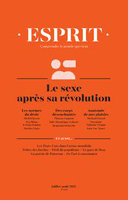
ESPRIT
Connecting Global Perspectives in Social SciencesESPRIT is a well-established journal that has been contributing to the fields of Arts and Humanities, Political Science, and Sociology since its inception in 1973. Published in France and bearing the ISSN 0014-0759 and E-ISSN 2111-4579, ESPRIT provides a scholarly platform for research articles that delve into diverse cultural, political, and sociological themes, facilitating critical discourse among academics and practitioners. Although it currently operates under traditional access models, its relevance is underscored by its rankings in Scopus, including a Q4 classification across multiple categories, making it a key resource for those exploring nuanced academic landscapes. With an address located in the heart of Paris, ESPRIT draws from a rich cultural context that enhances its publication scope, poised to inspire and inform a global audience dedicated to the advancement of knowledge in the humanities and social sciences.
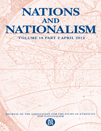
Nations and Nationalism
Fostering Insight into Ethnicity and IdentityNations and Nationalism, published by WILEY, is a leading journal in the fields of Arts and Humanities, Geography, Planning and Development, and Political Science and International Relations. With an impressive impact factor and categorized in the Q1 quartile for 2023, this journal provides a critical platform for scholarly debates and research on issues related to national identity, ethnicity, and the dynamics of nationalism as we understand them today. This journal, which has maintained its relevance since its inception in 1995, is indexed in Scopus, ranking robustly within the social sciences and humanities sectors. It is essential reading for researchers, educators, and students aiming to understand the profound influences of nationalistic sentiments on global geopolitics and societal structures. While open access options are not available, the journal is committed to advancing knowledge and fostering discussion through its high-quality, peer-reviewed articles.